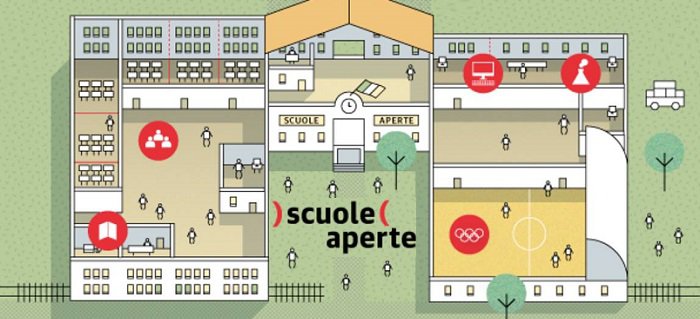The school is changing, and it has realized the importance of knocking down the classroom walls, of going out to public squares
“Think of the hole in the ozone that will be created between 9 June and 5 September, more or less. Schools must not become babysitters. But, I was in Israel a week ago and they told me about this extraordinary education minister who is trying to do a huge reform: the principle is that of giving schools even time in summer”. These are the words of Italy’s minister of education Stefania Giannini who, in a recent interview with the daily “Corriere della Sera” dropped the idea of opening Italian schools even during the summer. This idea was also recently launched by the Milanese monthly publication “Vita”, Miur, Anci, and the City of Milan to promote the first national forum for Schools Open .
For the first time a debate has begun on the use of the education institutions in Italy that all close during the summer months but could, instead, be used as a space that is open to everyone: elderly, children, associations, creative enterprises. Courtyards could become public gardens, bocce ball courts, organic markets; libraries and meeting points, rooms that become civic centers and spaces that host theatrical companies. I have encountered many of these experiences: one for all.
In Cinisello Balsamo (near Milan), the person who opened their doors to the cultural association that promotes theatre in cities, Andronauti, was not from a church or from the city government but was the principle of an elementary school who gave the school’s keys to moms and dads who now, in the evening, when classes are finished, give theater lessons. There is also an Open School at Istituto “Cadorna” in Milan, where Italians used to escape from because there were too many foreigners, similar to “Di Donato” in Rome, which has become a European example for social cohesion in one of the most multiethnic areas of the city. In Milan, an office dedicated to these experiences will open at MIUR with the scope of relating these practices that exist in Italy.
The monthly magazine “Vita” is ready to launch a manifesto with the fundamental elements, the foundation of the project: a structure that is open to students and their families beyond the traditional times scheduled for learning. A school that is open to the neighborhood, and is a place where integration and inclusion occurs for foreign communities and for those who need more attention. It is an experience of subsidiarity with parents as the new protagonists; an alliance between school and territory. These are words that already coexist in many cities.
Experiences that, on Monday June 16 at the “Cardano” institute of Milan, was discussed among the men and women who work in the world of non-profit: from Exodus to Movi, from Rete Senza Zaino to Coldiretti and Forum Associazione Genitori. The school is changing, and it has realized the importance of knocking down the classroom walls, of going out to public squares and hosting those who are in these squares: an exchange between generations, between men and women in different countries. It is an occasion to escape the crisis with a proposal that comes from those who live in the world of schools.





